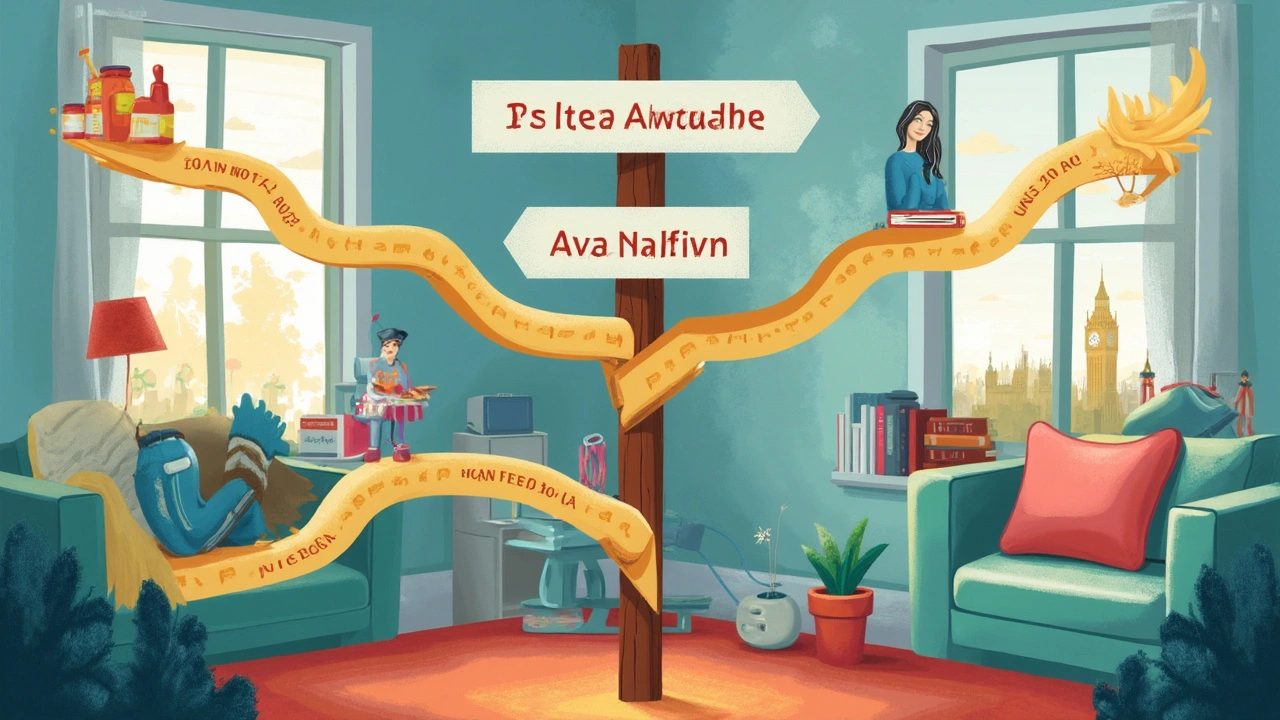Antabuse has been around for decades, but in 2025, it’s far from the only option on the shelf for treating alcohol use disorder. With more people looking for something that fits their life and actually works, doctors are offering other choices—some with fewer side effects or different ways of supporting sobriety.
What’s out there now? Some of the newer meds help cut cravings, some help manage triggers in your brain, and some act as backup when temptation strikes. Others mix therapy and meds, for a plan that deals with both your head and your body. If you’re tired of white-knuckling through side effects, or just want to know what 2025 has to offer, you’re in the right spot. Let’s break down these Antabuse alternatives, one by one—so you know exactly what you’re getting yourself into.
- Naltrexone
- Acamprosate
- Topiramate
- Baclofen
- Medication-Assisted Therapy (MAT)
- Nalmefene
- Summary Table & Final Thoughts
Naltrexone
When folks are talking about Antabuse alternatives in 2025, Naltrexone is usually the first name that comes up. It’s not new—it’s been used for alcohol use disorder for over twenty years—but doctors keep recommending it for a reason: it helps take the pleasure out of drinking, which really changes the game.
Naltrexone works by blocking the brain’s opioid receptors. When you drink, you just don’t get that buzz or happy feeling you might expect. You can still physically drink, but most people end up wondering why they’d bother if it’s not giving them the effect they want. Some folks call it "the anti-reward pill." It won’t make you sick if you slip and have a beer (unlike Antabuse). Instead, it quietly takes away the fun of drinking, making it much easier to cut down or quit altogether.
The cool thing? Naltrexone is available in a daily pill or a once-a-month shot (that’s called Vivitrol). The shot is handy for people who forget pills or don’t want another thing to remember every morning. Research shows the shot can boost sticking with treatment—one recent study found about 54% of patients stayed sober for at least 3 months with the shot, compared to under 40% with just the pill.
Pros
- Takes away the desire for alcohol by blocking pleasure in the brain
- No nasty reactions if you slip and drink
- Flexible—can use as a pill or a monthly shot
- Works for folks who want to drink less, not just quit completely
Cons
- Doesn’t work as well if you skip doses or skip the shot
- Some people get nausea, headaches, or feel kind of numb emotionally
- Can’t use it if you’re taking opioids for pain—it’ll block those meds too
- A few insurance plans still won’t cover the shot version
If you want something that helps with cravings, doesn’t punish you for mistakes, and has science behind it, Naltrexone is worth a serious look. People in my own circle have found it helps them get their life back on track, especially when used alongside therapy and honest conversations about what’s driving their drinking.
Acamprosate
If you’re looking for something other than Antabuse to help with alcoholism treatment, Acamprosate is worth a look. Unlike Antabuse, which makes you feel sick if you drink, Acamprosate targets the chemical balance in your brain after you stop drinking. Basically, it helps your brain chill out as it re-adjusts to life without alcohol.
Acamprosate is usually taken three times a day as a small tablet. It doesn’t do anything if you keep drinking, so it really works best for folks who have already quit and want to stay sober. What sets it apart is how it tries to smooth out those mood swings and sleep problems that show up when you first stop drinking.
| How It's Taken | Main Use | Notable Side Effects |
|---|---|---|
| Oral tablets (3x daily) | Help maintain sobriety after quitting alcohol | Diarrhea, headache, nausea |
Doctors say Acamprosate has no effect if alcohol is still in your system, so you’ve got to be through the detox phase before starting. Some folks see the biggest improvements in anxiety and need less medical monitoring because it’s well tolerated by the liver—a big deal if drinking has already caused some damage.
Pros
- Doesn’t react with alcohol—no sudden sickness if you slip up
- Can be used even if you have liver issues
- Helps with anxiety, mood swings, and sleep issues linked to quitting
- Low risk for interactions with other meds
Cons
- Needs to be taken three times a day, so some folks forget doses
- Does not treat withdrawal symptoms—only helps after detox
- May cause stomach issues, especially diarrhea
- Not for those with severe kidney problems
If you’ve already made it through the first rough patch and want solid backup to stay on track, Acamprosate is one of the top Antabuse alternatives in 2025. Just keep in mind, it’s not magic—you’ve still got to do the work. But for many people, having fewer cravings and better sleep can really keep sobriety moving forward.
Topiramate
Here's one most folks haven’t considered for alcohol alternatives 2025: Topiramate. You might know it as a seizure or migraine drug, but doctors use it off-label to help with alcoholism treatment. What’s the story? Basically, topiramate messes with the brain chemicals that make you crave a drink. This doesn’t mean you’ll magically stop thinking about alcohol, but it does mean your brain won’t light up the same way when you’re tempted.
Unlike Antabuse, which freaks your system out if you touch a drop, topiramate works more quietly. It makes alcohol less rewarding, so you naturally end up drinking less. There was a 2023 study where folks using topiramate cut down on heavy drinking days by almost half compared to sugar pills. The best results show up if you’re ready to cut back but don’t want to—or can’t—go cold turkey.
Pros
- Gets your brain craving less alcohol, rather than punishing you for drinking
- Can help with anxiety or migraines at the same time
- No wild reaction if you slip up and have a drink
- Sometimes used with other alcoholism treatment meds for more effect
Cons
- Can cause brain fog and slowed thinking for some people
- Tingling in fingers or toes and taste changes aren’t rare
- Doesn’t work for everyone—if you’re after zero cravings, results can be hit-or-miss
- Might need a slow ramp-up to avoid side effects
A quick check: If you have kidney stones or glaucoma, topiramate isn’t your friend. But if side effects are mild, and you want to quietly cut down instead of risking a harsh reaction, it could be worth asking your doctor about. As with any Antabuse substitute, stick with follow-ups and keep notes on how you feel. Those little details help your provider tweak things for the best shot at success.

Baclofen
Baclofen isn’t exactly a household name for alcoholism treatment, but in 2025, a lot more people are giving it a shot. Originally made as a muscle relaxant for issues like spasticity from multiple sclerosis, doctors noticed something surprising: it can also cool off the brain’s urge for a drink. In fact, a European trial published in 2023 showed that some people using baclofen nearly doubled their sober days compared to those going without treatment.
Baclofen works in the brain by acting on GABA receptors—basically quieting down brain circuits that fire up cravings. Unlike Antabuse, it doesn’t make you sick if you drink. Instead, it can dull the "need a drink now" feeling, so it’s a good fit for folks who struggle with strong urges or compulsive drinking. You take it as a daily pill, normally starting with a lower dose and gradually working up, since everyone’s brain handles it differently.
Pros
- Doesn’t cause harsh reactions if you do slip and drink.
- Can help especially with anxiety-driven drinking or obsessive cravings.
- Usually covered by insurance in the U.S. and widely prescribed in Europe for alcohol use disorder.
- Possible to combine with behavioral therapy or other medications.
Cons
- Side effects like drowsiness, dizziness, or muscle weakness—especially when you first start or up your dose.
- Needs careful dose management; too high can make side effects worse, too low might not work at all.
- Not officially FDA-approved for alcohol use disorder, so you might run into insurance hassles or need a doctor willing to prescribe it “off-label.”
- Some people notice mood swings or feel emotionally "flat."
If you’re worried about severe side effects from Antabuse or need something that targets anxiety and cravings at the same time, baclofen is worth talking about with your doctor. A quick chat about current meds and possible interactions can help decide if it's a safer bet for your recovery journey.
Medication-Assisted Therapy (MAT)
Medication-Assisted Therapy (MAT) is changing the way we approach alcohol use disorder in 2025. Instead of choosing just pills or just therapy, MAT brings them together. You might get a prescription like naltrexone or acamprosate to help with cravings or brain chemistry, but you’ll also have regular sessions with a therapist who actually gets what you’re fighting. The goal? Tackle the problem on every front—physical and mental—at the same time.
Here’s the deal: MAT isn’t a copy-paste setup. You and your doctor (or counselor) can change the meds and the kind of therapy, depending on what’s working or not. Some clinics even involve family sessions or support groups, so you’re not going at it alone. Studies show that people using MAT are 2-3 times more likely to stick with their recovery plan for a full year versus meds or therapy alone.
Pros
- Holistic approach—Targets body and mind at the same time, so relapse is less likely to sneak up on you.
- Customizable—Doctors can switch up medications or counseling styles based on what actually helps you.
- Bigger support circle—Often involves counselors, peer groups, even family, so you feel less like it’s all on you.
- Better outcomes—Research from early 2025 shows MAT boosts long-term recovery rates.
Cons
- Can be expensive—You’re paying for therapy and medication, which adds up, especially if insurance coverage is spotty.
- Scheduling is a hassle—Keeping up with both meds and appointments is tough for people with work or kids (trust me, I have two!).
- Not magic—Still depends on you showing up and sticking to the plan. If you miss sessions, results drop fast.
- Access isn’t equal—Some towns have barely any therapists trained in MAT, so finding the right help can be tricky.
| MAT Medication | What It Does | Common Side Effects |
|---|---|---|
| Naltrexone | Cuts cravings and blocks pleasure from alcohol | Nausea, headache, tiredness |
| Acamprosate | Helps the brain restore balance after quitting drinking | Diarrhea, stomach upset, anxiety |
| Disulfiram (Antabuse) | Makes drinking very unpleasant | Flushing, nausea, vomiting |
If Antabuse didn’t quite fit your life, MAT gives you more tools and backup. The main challenge? It only works as well as your ability to keep up with appointments and stick with the plan. But for a lot of people, having this double-pronged support is a game changer in staying off alcohol for good.
Nalmefene
Nalmefene is a newer player in treating alcohol use disorder, and it’s been picking up attention in Antabuse alternative discussions—especially throughout Europe. Unlike older medications that make you sick if you drink, nalmefene is all about dialing down the urge to keep drinking after you start. It goes under brand names like Selincro, and it’s designed for people who want to cut back, not just quit cold turkey.
This med works by blocking certain opioid receptors in your brain. In simple terms, it makes alcohol less rewarding, so that next glass doesn’t feel as tempting. The cool part? You only take it when you think you’re about to drink, not every day. For someone with busy days, kids running around (like mine, Nolan and Finley), and an unpredictable schedule, that makes a big difference.
If you’re more into stats, clinical trials have shown nalmefene can help folks reduce their heavy drinking days by up to 60% over six months. That doesn’t mean you’re forced into total sobriety from day one, but you’re getting real help managing how much you drink.
Pros
- Flexible use: Take it only when needed, not daily.
- Targets cravings and relapse risk, not just withdrawal.
- Less punishing than disulfiram—no harsh sickness if you slip up.
- Well-studied in Europe, especially for people looking to cut down, not just quit.
Cons
- Not available everywhere—U.S. approval is still pending as of 2025.
- May not completely stop cravings for everyone.
- Some report mild side effects—nausea, dizziness, sleep issues.
- You still need to remember to take it before drinking, which can be tricky if habits are strong.
If you’re scanning for a 2025 Antabuse alternative that fits a more flexible, modern lifestyle, nalmefene is one to watch for—especially if quitting entirely isn’t your only goal.

Summary Table & Final Thoughts
If you’ve been scouring the internet for Antabuse alternatives in 2025, you’ve seen just how many options there are now. Each medication or therapy has its own vibe, and it really comes down to what matches your life, your health, and what you’re hoping to get out of treatment. Some people do better with meds that cut the urge to drink, like naltrexone. Others want a plan with both therapy and medication, like Medication-Assisted Therapy (MAT). And then there are the options like acamprosate or baclofen that manage withdrawal and help you stick with it when things get tough.
Let’s make it easy. Here’s a side-by-side table so you can see how these Antabuse substitutes stack up:
| Alternative | Main Use | Good For | Downsides |
|---|---|---|---|
| Naltrexone | Blocks cravings, reduces buzz if you do drink | If you want fewer cravings but no punishment | Some get nausea, not for people with liver disease |
| Acamprosate | Helps reset brain post-drinking | Folks already detoxed, want to stay off booze | Pills 3x/day, can upset stomach |
| Topiramate | Lowers cravings, sometimes for off-label use | If other meds haven’t worked, specific triggers | Tingling, trouble concentrating |
| Baclofen | Reduces cravings, eases anxiety | Those who need a bit of anxiety help too | Drowsiness, needs regular monitoring |
| Medication-Assisted Therapy (MAT) | Team approach—meds + therapy | People wanting ongoing, total support | More appointments, could cost more |
| Nalmefene | Take as-needed, reduces urge to drink in the moment | Anyone not ready for full-on sobriety or planning slip-ups | May cause sleep trouble, should only use with doctor supervision |
Some quick tips for anyone considering a substitute for Antabuse:
- Don’t pick a med just because your buddy tried it—side effects and results are personal.
- It’s smart to bring up family history and any current meds with your doctor—combos matter.
- Think about how often you want to take pills, where you’ll get support, and how easy it’ll be to stick to the plan.
In 2025, there’s no need to tough it out with a one-size-fits-all fix. Options like Medication-Assisted Therapy and on-demand meds like nalmefene show just how far we’ve come since the days when Antabuse was your only shot. For a lot of folks—me included, looking out for family, kids, and future—having choices means actually sticking with it is more doable than ever. Ask questions, get honest about your needs, and work with your healthcare team for a plan that feels possible, not impossible.


Sushmita S
April 24, 2025 AT 06:36AnneMarie Carroll
April 25, 2025 AT 04:25John K
April 26, 2025 AT 18:24Laura Anderson
April 28, 2025 AT 11:49Avis Gilmer-McAlexander
April 30, 2025 AT 01:51Jerry Erot
May 1, 2025 AT 01:59Fay naf
May 2, 2025 AT 05:52ANTHONY SANCHEZ RAMOS
May 2, 2025 AT 17:02Matt Czyzewski
May 3, 2025 AT 17:39John Schmidt
May 3, 2025 AT 21:08Lucinda Harrowell
May 4, 2025 AT 09:16Joe Rahme
May 5, 2025 AT 16:49Leia not 'your worship'
May 6, 2025 AT 04:26